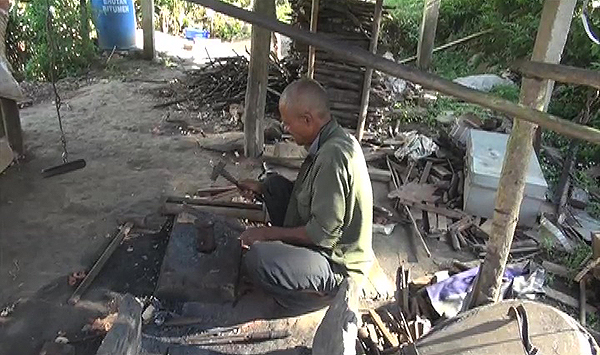 Blacksmith, a traditional craftsmanship handed down for several hundred years, is on the verge of extinction. With not many blacksmiths remaining and even lesser apprentices showing interest in learning the skill, reviving the age old craft looks challenging.
Blacksmith, a traditional craftsmanship handed down for several hundred years, is on the verge of extinction. With not many blacksmiths remaining and even lesser apprentices showing interest in learning the skill, reviving the age old craft looks challenging.
Tsirang, a place with a good number of artisans practicing the trade in the good old days, now only has a handful of them. 59-year-old Padma Lal Biswa from Tsholingkhar Gewog is among the last few remaining blacksmiths.
He has been into the trade for 45 years now. “In a place just nearby called Khorsani, there are people who are blacksmiths like us,” said Padma Lal Biswa.
“But they have all have abandoned the trade. Those who used to practice the trade has died and the young ones are not interested to continue it. I am the only blacksmith in the locality.”
Many factors are being blamed for the disappearance of the craft. The mechanisation of farm tools and kitchen wares is one. As people opted for imported, factory-made tools and utensils, the blacksmiths found themselves losing their customers in droves. The popularity of the hand made products paled in comparison with the cheap and readily available imported ones.
The job of a blacksmith is also physically tiring, perhaps another reason why it has failed to attract the attention of the young job seekers.
There are also other factors like the difficulty in finding raw materials. “It’s not an easy job,” said 67-year-old Dawala, a blacksmith from Gosarling Gewog.
“Firstly, it is challenging to get metal and charcoal. If we are able to work fulltime, we would be able to earn good. Crops come with shelf life but the tools and the utensils that we make do not go bad with time.”
The social stigma that the trade carries is also being seen as another contributing factor. Dawala says not many see it positively. “People look down on the blacksmiths. But to me, as long as you are not stealing, all jobs are respectable. I am proud of my job.”
Dawala believes that if the younger generation shows interest in embracing the trade, it would not only solve unemployment problem but also help revive the drying craft.
Padma Lal Biswa says he would be more than happy to teach anyone who is willing to learn the craft. “I will teach them whatever I know,” he said.
Reviving the centuries-old trade may be challenging but not impossible. The centre for iron craft opened in Paro last year upon the command of His Majesty The King is an important step towards reviving the craft and reinstating it as a source of livelihood.
The regional office of labour ministry in Gelegphu recently organized basic metal works training. Such trainings too would go a long way in ensuring the craft does not become a thing of the past.












